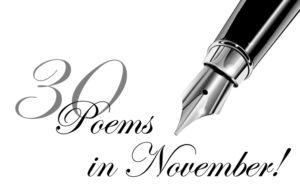
From the Center for New Americans: www.cnam.org
Once again, I’m taking on the challenge of writing 30 Poems in November as a fundraiser to benefit the Center for New Americans, a wonderful organization in our community that provides English classes and other assistance for immigrants. And once again, as the calendar reels toward November 1, I’m feeling the pressure and panic. How will I ever write 30 poems in a month? How will I even write one poem? Will I ever write a poem again? Adding to the pressure, I’ve promised to share the poems with those who’ve contributed to my fundraiser (if they want them) and I feel like I need to reach some minimal standard in order to avoid total embarrassment.
So, in the last few days of October, even though I’ve had more free time than I’ll likely have in November, where I have (on top of my regular commitments) two sets of guests, a week away for a family event, and a book coming out at the end of the month, I’ve been refraining from writing poems–hoping that whatever might be simmering will build up to a boiling overflow of precious words the minute the calendar page turns. If only I weren’t such a “good girl,” I could write today, or cheat and count some of the poems I wrote earlier in October in the mix, but the beauty of this challenge for me is in the practice of sitting down every single day in November and attempting to write something I can wrestle into a “poem” that counts in the total.
Emphasized word here is not “poem” but practice.
Some of us might practice yoga, or meditation, or a musical instrument, or our dance moves. But it’s hard to think of practicing writing. Too many of us (myself included) expect that everything we write needs to have some productive purpose. And while those of us in the wonderfully supportive writing community that’s sprung up around this annual November fundraiser often remind each other that it’s “okay if the poems are bad,” this still implies a judgment of our work, which doesn’t need to be there.
We’re simply practicing.
If this year is similar to past years, it’s likely I’ll write a few poems I’m very happy with, several others that have potential, which I’ll noodle with until I either abandon them or send them out, and others that I’ll immediately file away as inactive. It doesn’t matter, I’ll be writing. And when I send November’s poetry harvest to those donors who’ve requested it, I’ll add the reminder that these are “poems-in-progress,” not finished masterpieces. A rehearsal, not a performance.
And like in music, or dance, or yoga, practicing does pay off. I’ve done this practice for seven years, which means I’ve drafted 210 poems. 47 of them, more than 20 percent, have been published, often years after I wrote them and in versions that were quite different from my initial November drafts.
If you’d like to contribute to my fundraiser, you can do so here. Or, you can sign up and do your own 30 poems this November. It’s not too late! As bonus, you get a prompt by email every day from the marvelous 30 Poems Coordinator, Sarah Sullivan–and as I stated in an earlier post, prompts can be your golden ticket to creativity. I’ve found that doing this practice in November is a great way to keep my spirits up in the encroaching late-afternoon darkness. And I promise you, your poems don’t have to be good–or bad–or anything that carries a label of judgment. They just have to be.




